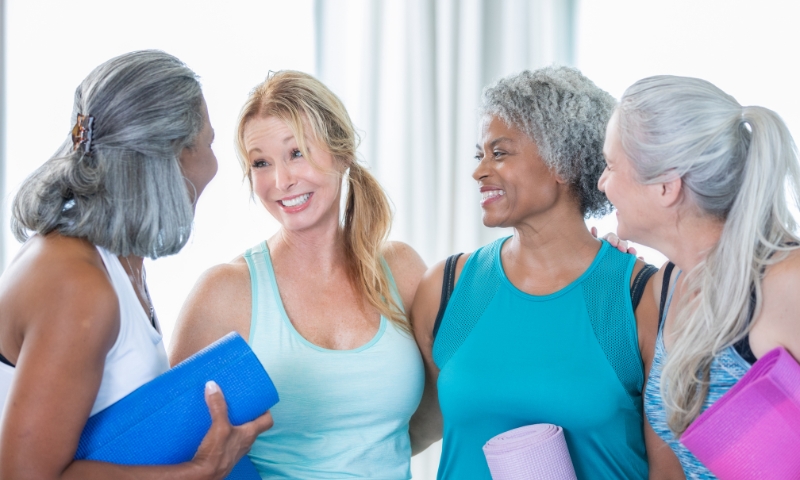As we age, prioritizing physical movement becomes more than just a strategy for maintaining physical health—it’s a powerful tool for fostering mental wellness. Exercise has long been touted for its ability to enhance mood, sharpen cognitive function, and reduce stress, making it an essential element in the lives of active agers. Understanding the mental health benefits of movement can help individuals stay motivated and incorporate regular physical activity into their daily routines.

Enhanced Mood and Stress Reduction
One of the most immediate benefits of exercise is its ability to improve mood and alleviate stress. When you engage in physical activity, your body releases endorphins, often called “feel-good” hormones. These chemicals interact with receptors in the brain, reducing pain perception and triggering a positive feeling. For active agers, this release of endorphins can be especially beneficial as it helps mitigate feelings of anxiety, stress, and even depression.
As we age, managing stress becomes more crucial for overall well-being. The pressures of life may evolve, including health concerns, changes in living situations, or the loss of loved ones. Exercise serves as a natural outlet to manage these stresses. It allows the mind to shift away from worries, providing a reprieve and creating space for clarity and peace. Movement becomes a potent strategy for managing mental health and maintaining emotional equilibrium, whether it’s a walk in the park, a yoga session, or a strength training class.
Improved Cognitive Function
Regular physical activity isn’t just good for the body—it’s great for the brain, too. Studies have shown that exercise enhances cognitive function, including memory, attention, and problem-solving skills. This is especially important for active agers, as cognitive decline is a common concern as we age. Incorporating movement into daily life can help protect against the natural aging process in the brain.
Physical activities that require coordination, balance, and quick decision-making are particularly beneficial. For example, dance classes or group fitness sessions that involve learning new routines engage the brain in ways that stimulate cognitive growth. These activities challenge the mind while providing the body with the physical benefits of exercise, creating a holistic approach to health.
Reduced Risk of Specific Diseases
When we exercise, blood flow to the brain increases, supplying it with more oxygen and nutrients. This increased circulation stimulates the growth of new brain cells and improves connections between existing ones. Regular physical activity has even been linked to a decreased risk of developing neurodegenerative diseases like Alzheimer’s and dementia. In essence, movement can act as a protective shield for the mind, helping to preserve mental sharpness and cognitive function as we age.
Better Sleep Quality
Sleep is a cornerstone of good health, yet many older adults struggle with sleep disturbances. Whether it’s difficulty falling asleep, waking up during the night, or feeling unrested in the morning, sleep issues can significantly affect mental wellness. Physical movement, however, can be a natural remedy.
Regular exercise has been shown to improve sleep quality by helping the body regulate its circadian rhythms. When we move our bodies, we expend energy, which makes it easier to fall asleep at night and promotes deeper, more restorative sleep. For active agers, this improvement in sleep can profoundly affect overall well-being.
Increased Self-Esteem and Confidence
Maintaining a sense of independence and self-confidence is critical for mental well-being as we age. Regular exercise can play a vital role in fostering these feelings, providing physical and psychological benefits that bolster self-esteem.
Exercise, especially when performed consistently, can improve strength, flexibility, and mobility, making daily tasks easier. This sense of physical capability can have a direct impact on mental wellness. For active agers, feeling strong and capable promotes a sense of control over their bodies and lives, which is key to building and maintaining self-confidence.
The social aspects of exercise also contribute to increased self-esteem. Group fitness classes, for example, offer a supportive environment where active agers can connect with others, form friendships, and share in mutual goals. These social bonds enhance feelings of belonging and reduce the sense of isolation that many older adults face. Combining physical achievement and social interaction creates a positive feedback loop reinforcing confidence and self-worth.
Movement as a Foundation for Mental Wellness
Incorporating regular movement into the lives of active agers is not just about improving physical health—it’s about creating a foundation for sustained mental wellness. Whether it’s a structured exercise program or simply increasing daily activity, movement acts as a multifaceted tool for improving mood, cognitive function, sleep, and self-esteem. For active agers, these mental health benefits are invaluable, helping them navigate the challenges and changes that come with aging.
